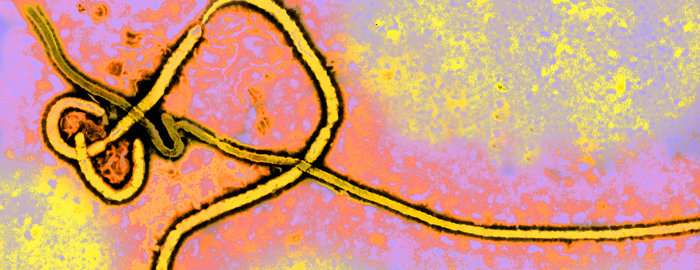New breakthrough paving the way for universal Ebola therapeutic

A new collaborative study has identified and studied Ebola antibodies that could be used to design universal therapeutics that are effective against many different Ebola species. The findings were recently published in Nature Microbiology.
The Ebola virus causes a severe illness with high mortality rates in humans. Several strategies have been developed to treat Ebola infection, including ZMapp, which has been shown to be effective in non-human primates and has been used under compassionate-treatment protocols in humans.
"The trouble with ZMapp is that although it is effective against the Ebola species that was largely responsible for the last Ebola outbreak, it does not neutralize other Ebola species, including Ebola Bundibugyo, Reston or Sudan," said virologist Alex Bukreyev, co-senior author and a University of Texas Medical Branch at Galveston professor in the department of pathology. "We identified and studied three naturally-occurring antibodies from human survivors of Ebola Bundibugyo that neutralize and protect against infection with the several different Ebola virus species."
The newly identified antibodies bond at a different site on the Ebola virus than other antibodies currently used to develop Ebola therapies.
Information on the Ebola virus:
According to the Centers for Disease Control, Ebola was first discovered in 1976 near the Ebola River in what is now the Democratic Republic of Congo. Since then, the virus has been infecting people from time to time, leading to outbreaks in several African countries.
Some of the different kinds of Ebola viruses are:
- Ebola virus (Zaire ebolavirus)
- Sudan virus (Sudan ebolavirus)
- Taï Forest virus (Taï Forest ebolavirus, formerly Côte d'Ivoire ebolavirus)
- Bundibugyo virus (Bundibugyo ebolavirus)
- Reston virus (Reston ebolavirus), known to cause disease in nonhuman primates and pigs, but not in people
More information: Andrew I. Flyak et al. Broadly neutralizing antibodies from human survivors target a conserved site in the Ebola virus glycoprotein HR2–MPER region, Nature Microbiology (2018). DOI: 10.1038/s41564-018-0157-z
Journal information: Nature Microbiology
Provided by University of Texas Medical Branch at Galveston


















